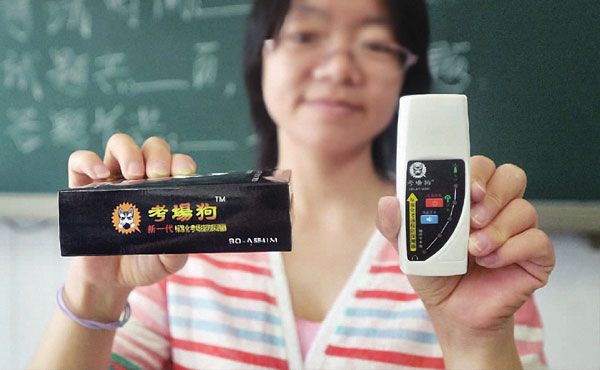Gaokao cheaters face dire consequences
By CHENG YINGQI (China Daily) Updated: 2016-06-07 07:28

After passing through multiple checkpoints, including facial recognition, fingerprint verification and a metal detector, students will finally be granted access, not to a bank vault, but to a radio-shielded room where they will take the national college entrance exam.
Chinese authorities are imposing strict measures to prevent cheating in this year's test-known as the gaokao-and those who cheat could get three to seven years in prison.
The anti-cheating measures also include the printing and transportation of test papers and the selection of exam supervisors.
Local education bureaus are collaborating with public security bureaus to introduce advanced technology that can identify cheaters.
For example, the Inner Mongolia autonomous region will use finger vein recognition-a new-generation biometric authentication technique that goes beyond fingerprints-to verify the identity of exam takers.
In Luoyang, Henan province, local authorities will use drones hovering 500 meters overhead to intercept any radio signals around the test buildings.
In a number of cities and provinces including Beijing and Guangzhou, all smartwatches that can transmit data will be banned.
Despite the deterrent value of harsh penalties, some cheaters are still willing to take the risk in other national-level exams.
For example, leaks of test documents to be used in this year's civil service exams occurred in Jiangxi and Anhui provinces.
"Under the current talent-selection system in China, exam performance is decisive for one's future. As a result, the general public pins high hopes on the fairness of large national exams such as the gaokao, the national postgraduate entrance examination and the civil service recruitment exams," said commentator Wang Jie of Beijing-based Science and Technology Daily.
Guo Dan, a Beijing mother whose daughter will take the gaokao in two years, said, "There is a benefit chain behind leaking test papers and organized cheating. So adopting stricter exam regulations will bring more fairness.
"That's why I support the new policies."
This year's gaokao will take place on Tuesday and Wednesday. About 9.4 million people are expected to take the exam.
By CHENG YINGQI (China Daily) Updated: 2016-06-07 07:28

An exam supervisor at Beijing Dongzhimen High School shows a monitoring device that can detect invisible earpieces used for cheating. The school is one of this year's gaokao sites.[LIU CHANG/CHINA DAILY]
After passing through multiple checkpoints, including facial recognition, fingerprint verification and a metal detector, students will finally be granted access, not to a bank vault, but to a radio-shielded room where they will take the national college entrance exam.
Chinese authorities are imposing strict measures to prevent cheating in this year's test-known as the gaokao-and those who cheat could get three to seven years in prison.
The anti-cheating measures also include the printing and transportation of test papers and the selection of exam supervisors.
Local education bureaus are collaborating with public security bureaus to introduce advanced technology that can identify cheaters.
For example, the Inner Mongolia autonomous region will use finger vein recognition-a new-generation biometric authentication technique that goes beyond fingerprints-to verify the identity of exam takers.
In Luoyang, Henan province, local authorities will use drones hovering 500 meters overhead to intercept any radio signals around the test buildings.
In a number of cities and provinces including Beijing and Guangzhou, all smartwatches that can transmit data will be banned.
Despite the deterrent value of harsh penalties, some cheaters are still willing to take the risk in other national-level exams.
For example, leaks of test documents to be used in this year's civil service exams occurred in Jiangxi and Anhui provinces.
"Under the current talent-selection system in China, exam performance is decisive for one's future. As a result, the general public pins high hopes on the fairness of large national exams such as the gaokao, the national postgraduate entrance examination and the civil service recruitment exams," said commentator Wang Jie of Beijing-based Science and Technology Daily.
Guo Dan, a Beijing mother whose daughter will take the gaokao in two years, said, "There is a benefit chain behind leaking test papers and organized cheating. So adopting stricter exam regulations will bring more fairness.
"That's why I support the new policies."
This year's gaokao will take place on Tuesday and Wednesday. About 9.4 million people are expected to take the exam.

